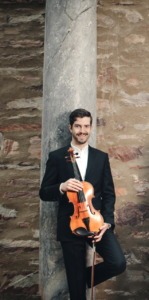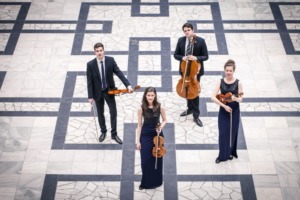The performing arts have to remain active even in times of crisis and do not have to destroy themselves through a free oversupply
Helmut Mauró, Suddeutsche Zeitung, 2 May 2020
Dear friends, today we’ll speak up. And even though I, who I am writing the text, speak for our entire ensemble, it’s easier if I formulate from my personal perspective – so Caspar Vinzens writes here.

Caspar Vinzens from the Aris Quartett. Photo Simona Bednarek
As you may have already noticed, or can see our channels here and on Instagram, it’s quite quiet around the Aris Quartett right now. There’s no great news to read and you can’t find any live streams either. Nobody knows how to deal with such a situation as the current one, finding a position on it takes time, especially in a group of four people.
We have found our common attitude by now. And since I read Helmut Mauró’s recent article in the Süddeutsche Zeitung (translated below) that speaks from my soul in many ways, I would like to explain our attitude on the current situation! In doing so, I do not rule out that it can change over time, nor do I want to condemn the attitude of others who may oppose ours as not properly. Much more is about sharing my thoughts and pointing out developments that I find worrying.
As we all know, the Corona crisis is making the lives of countless people and professional sectors at the moment. In this respect, I would like to deliberately only address the professional, not the health aspect, from our point of view as a free artist.
The Aris Quartett is 100 % hit by the crisis – we have deliberately not sought orchestra or apprenticeships in all these past years, but have focused on the careers as freelance musicians. So now we live exclusively on concert – home office and short-time work do not exist for us in this form. No concerts = no money. We are forced by comprehensible, health decisions to be able to temporarily (economically) our profession (that all the state aid funds are declared in such a way that we cannot apply for any of them is another story, which I do not at this point at all would like to enter).
Many people feel like us!
Now it didn’t wait long for a certain attitude of ” becoming inventive ” and ” Making the most of the situation That’s great, because many people can’t afford to stick their head in the sand and secondly, in response to not being allowed to express themselves in the usual way artistically.
We used the time to go on unexpected Easter holidays. I myself went to the Swiss mountains with one of my brothers for two weeks to the Swiss mountains. There I hardly noticed anything about the crisis and enjoyed the time extremely. When I was back in Frankfurt to start the joint rehearsal work, the situation was already a completely different one. Several organizers had already cancelled agreed concerts, the end of the state of emergency was becoming increasingly distant and a trend evolved on the internet that continues to this day and I would like to address in particular!
As an “inventive response” to circumstances, the streaming of house concerts seems to be established. I find this worrying for various reasons.
First of all, I wonder who helped with this. As a rule, we artists don’t earn anything about it and consumers usually get music in relatively poor quality. Or what else do you justify working and filing on professional recordings for days and weeks? I have hardly heard and seen an online live concert that would have convinced me in its quality (sound / picture). So if I want to listen to music without going to the concert, I personally prefer to put in a good CD, go on platforms like Spotify or watch videos on YouTube. There is almost every music in excellent quality everywhere. Of course, I prefer to go to the concert, because classical music, like other genres, lives from being present! BUT THIS IS NOT WORKING! AND THIS MUST BE AS BAD AS IT SOUNDS TO BE! Classical music is currently exposed, it can’t just be moved to virtual. That is the second important point, which I find very worrying.
The biggest goal of our age seems to be to expand the data highway to make everything virtual. I do not condemn that in principle. But I have always believed that art is the last thing that can be taken from us virtually, since it really comes from active experience on site – be that in the museum or in concert! A Mona Lisa is not interesting when I google her, but when I experience it, I am deeply convinced of that.
Our music can’t take place right now. If society cares about keeping the unique cultural landscape alive in this country, then it must be fought for it. This is the third point that gives me to think. It’s only a matter of time before even fewer money goes into culture at the political level, since, as it could be argued, we artists have “proved that all this is going on their own”.
I don’t think anything can happen under these circumstances! I don’t want to call for nothing!

Aris Quartett (almost socially distancing) Photo Simona Bednarek
Our attitude looks like we continue to work meticulously, we have been rehearsing again for almost a month (of course with a prescribed safety distance), continue to expand further expanding our repertoire and make the finishing touches on our new CD. We don’t give any stream concerts out of conviction! Because this would encourage an ” unfortunate development ” as the Süddeutsche Zeitung puts it so aptly – a development back to the “beggar status of a hiking musician”, or to the impression that everything we do is a Hobby acts.
We know that many people interested in culture are eagerly hungry for art in all their facets, we too, too, want this fulfilment!
With this in mind, hopefully very soon,
All the best and good health,
Your Caspar from Aris Quartett

from Süddeutsche Zeitung 2 May 2020
“Now that the first easing of the corona measures is pending, it is being considered whether one could not also help the freelance musicians. A 5.4 million aid for free orchestras and ensembles was decided. It doesn’t sound bad, but on closer inspection it turns out to be a support program for new forms of music presentation in times of the pandemic. But music is not just a presentation, but a complex social interaction. The fresh money for the support comes from an old funding concept that has now been re-labelled as a Corona aid program. But will 5.4 million people be able to save the musical part of our cultural landscape? Why do the musicians come into focus so late, why is the discussion about social relevance so much about the importance of the hairdresser and so little about the violin teacher? How can you explain that – as now in Salzburg – the pubs are opened and the students of the music university who rely on analogue lessons are standing in front of closed doors?
“As much as the state hygiene regulations are due to the constraints, as far as grants are concerned, traditional mechanisms such as the influence of lobbyists and association officials are effective. The free musicians seem to be in a bad position. There are also associations of interests here, but the individual concerns appear diffuse, the spectrum of the Ich-AGs diverse. There is also a tendency that intensified during the Corona crisis: Artists give away their work free of charge on the Internet. This reinforces the impression that this is a hobby. You like to do it and everyone can participate. Passion is the core of music, but there has long been an innocent and selfless state of art production. If every performance has to be measured in remuneration, as is the case in our economic system, then musicians are not allowed to indulge in vain.
“Musicians retreat to a beggar status that had long been overcome
“It was a long way from the almost bird-free status of the travelling musician to the heated rooms of the Fürstenhöfe and finally to the proud independence. The fact that orchestral musicians still wear tailcoats is also a sign of this emancipation – Joseph Haydn still had to wear servants’ uniforms – and a symbol of fear of falling back into old conditions. With the founding of today’s GEMA, pioneers like Richard Strauss and Hans Sommer have shown how existential interests can be asserted and do not have to be applauded.
“But all of this is at risk if musicians of all genres and genres offer their work for free. And with great zeal, a mixture of idealism and fear neurosis, you can no longer be noticed. Where that leads can be seen from the now usual record contracts, in which the label earns more than ever from the work of the artist, without participating in the work with marketing investments, for example. As for the current situation, the musicians suddenly withdraw to a beggar status that had long been overcome. The acquisition of tips via platforms such as Patreon or Bandcamp, where musicians put their best foot forward, are desperate examples of personal crisis management. Streaming appearances or contributions on video and streaming portals bring in at most minimum amounts. This is neither promising nor does it fit into a society in which many contribute to the fact that art and culture make up an essential part of our identity. That is why the performing arts have to remain active even in times of crisis and do not have to dismantle themselves through a free oversupply.”
Original article here www.sueddeutsche.de/kultur/kuenstler-musik-hilfe-staat-staatshilfen-kommentar